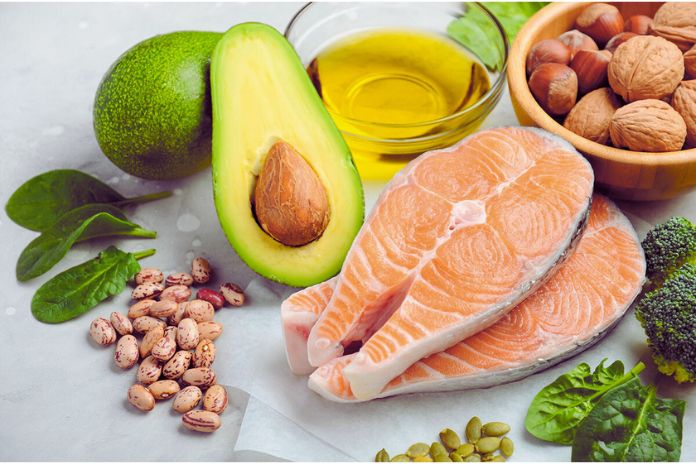In addition to carbohydrates and proteins, different types of fat are part of our diet and provide the energy we need to carry out our daily activities.
Fats (or lipids), proteins, and carbohydrates are part of a group called macronutrients. They form large structures and therefore need to be broken down into much smaller pieces to be properly absorbed by the body.
The digestion of fats takes place in the intestine, where they give rise to two other substances: fatty acids and glycerol. In addition to participating in various processes in the body, fats are the largest energy source for the body. While 1 g of carbohydrates and proteins provides 4 kcal, 1 g of lipids provides 9 kcal.
Fat: Ally Or Villain?
If fat exists naturally in food, it means that the body needs it. As we have seen, it provides energy and is a source of vitamins A, D, E, and K. Therefore, its consumption is necessary to prevent bleeding, osteoporosis, and blindness, among other problems.
However, the last information in the previous topic is a warning. Fat provides more than twice the energy of other macronutrients, carbohydrates, and proteins. So, even when looking for healthy sources of lipids, consumption should be moderate so as not to increase the number of calories ingested.
Types Of Fat: What Are They?
In addition to the amount of lipids consumed, we also need to take care of the quality of this nutrient. Next, we’ll talk about the main types of fat and their effects on the body.
Saturated Fat
Naturally, saturated fat is obtained through animal foods. It is present in all types of meat, but the concentration is higher in red meat and poultry skin. Other products containing saturated fats are bacon, cream, eggs, cheese, butter, and yogurt.
Saturated fat is harmful to the body and is not essential for the proper functioning of the body. It increases bad cholesterol levels (LDL). These plaques deposit in the blood vessels, causing cardiovascular problems.
To give you an idea, think about the following: when you roast meat, the pan is filled with soft fat, practically liquid, right? It makes your plate shiny and attractive.
However, after that same meat cools, that fat becomes pasty and yellowish, forming plaques. This is exactly how she behaves in her body, creating barriers that prevent good blood circulation and cause various health problems.
Trans Fat
Until recently, people had no idea how much trans fat harms the body. However, after studies showed its negative impacts on health, even the laws were changed to alert the population about the presence of this substance in food products.
Many industrialized products contain trans fat. It is produced from the hydrogenation of vegetable fats. The industry mixes hydrogen gas and polyunsaturated vegetable oils using a catalyst substance (usually nickel).
When this mixture occurs at the appropriate temperature and pressure, vegetable oils are transformed into fatty acids. This makes these foods’ appearance and consistency more pleasant, and the shelf life also increases.
However, what is pleasant for the palate, in this case, is not good for health. Trans fat is as or more dangerous than saturated fat. It increases bad cholesterol levels (LDL-c), which causes plaque deposits in blood vessels and the development of high blood pressure, heart disease, and stroke.
Unsaturated Fats
Unsaturated fats are the healthiest. In the body, they participate in processes related to reducing bad cholesterol (LDL). They are mainly obtained from foods of plant origin and some fish.
Among the sources of unsaturated fats, we can highlight olives, oilseeds (Brazil nuts, almonds, macadamia, walnuts, cashews), linseed, chia, coconut, avocado, and salmon.
There are two types of unsaturated fats: monounsaturated and polyunsaturated. See what the difference is!
Polyunsaturated Fats
Among the types of fat, the polyunsaturated ones stand out for their richness in essential fatty acids — Omega 3 and Omega 6. The body does not produce these substances, but we must include them in our diet.
Polyunsaturated fat acts in the fight against bad cholesterol (LDL). However, it also reduces good cholesterol (HDL). So even though it’s beneficial, it’s important to consume it in moderation.
Another effect of polyunsaturated fat is its anti-inflammatory action. It fights inflammation caused by external agents, such as viruses and bacteria, and unhealthy habits. In this way, they act as allies of the immune system, preventing several diseases.
Among the sources of polyunsaturated fats, we highlight nuts and pumpkin seeds. It can also be found in some fish, such as tuna and sardines, as well as in vegetable oils (soy, canola, olive oil, etc.).
Monounsaturated Fats
Monounsaturated fat is the main ally in the fight against bad cholesterol. It increases good cholesterol (HDL) levels while lowering bad cholesterol (LDL). It is found in olives and their derivatives, avocado, peanuts, and nuts.
Refined Fat: When To Use It?
You already realize that saturated and trans fats should be avoided by anyone who wants to achieve good health, especially if the goal is to protect the heart and circulation, avoiding infarctions, strokes, and other similar problems.
However, we can make this intake healthier even when discussing vegetable fats. In nature, foods have the ideal concentration of nutrients and substances. Therefore, we should use them that way whenever possible, avoiding refined versions.
Therefore, instead of coconut oil, the ideal is to insert coconut into your diet. The same goes for olive oil which, while much better than other oils, is still a refined fat. In that case, the healthiest option is to consume the olives themselves.
Is it better to use olive oil than soybean or corn oil? Yes. However, for the good of the heart, even this consumption must be moderate, restricting itself to a few drops until the palate adapts to food in its natural state.
Also Read: Healthy Eating: Why Is It So Important To Your Life?

